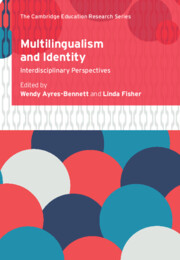Book contents
- Multilingualism and Identity
- Multilingualism and Identity
- Copyright page
- Contents
- Figures
- Tables
- Contributors
- 1 Towards Interdisciplinarity in Multilingual Identity Research
- Part I Situated Multilingualism and Identity
- Part II Multilingual Identity Practices
- 8 Decolonizing Languages in Rural Settings
- 9 Seeking Methodological Rigour in Language and Identity Research
- 10 Translation, Identity and Translanguaging
- 11 The Complexity of Identities
- 12 Narrating Heterogeneous Identities in Multilingual Communities
- Part III Multilingual Identity and Investment
- References
- Index
9 - Seeking Methodological Rigour in Language and Identity Research
Applying a Version of Positioning Theory to a Research Interview Excerpt
from Part II - Multilingual Identity Practices
Published online by Cambridge University Press: 22 July 2022
- Multilingualism and Identity
- Multilingualism and Identity
- Copyright page
- Contents
- Figures
- Tables
- Contributors
- 1 Towards Interdisciplinarity in Multilingual Identity Research
- Part I Situated Multilingualism and Identity
- Part II Multilingual Identity Practices
- 8 Decolonizing Languages in Rural Settings
- 9 Seeking Methodological Rigour in Language and Identity Research
- 10 Translation, Identity and Translanguaging
- 11 The Complexity of Identities
- 12 Narrating Heterogeneous Identities in Multilingual Communities
- Part III Multilingual Identity and Investment
- References
- Index
Summary
This chapter returns to a long-standing issue in in language and identity research based on life story interviews - the need for theoretical and methodological rigour (Pavlenko, 2007). It begins with background: first a brief discussion of identity that highlights those aspects of the construct that later come to the fore, and second, presentation of a version of positioning theory (PT) recently developed by the author (Block, 2017). This version draws on the original PT model developed by Rom Harré and his associates but importantly, it expands on this model with the addition of constructs taken from sociolinguistics, sociology and social theory, including authenticity and authentication (Bucholtz, 2003), belonging (Guibernau, 2013), field and habitus (Bourdieu, 1993, 2000), discourse formations and gaze (Foucault, 1989, 2003) and resistance (Seymour, 2006). The second half of the chapter examines an excerpt from an interview with an English-medium instruction lecturer, drawing on constructs developed in the first part. The aim is to show how the version of PT presented can lead to a detailed and nuanced interpretation of the construction of identity, turn by turn, in an interaction.
Keywords
- Type
- Chapter
- Information
- Multilingualism and IdentityInterdisciplinary Perspectives, pp. 181 - 200Publisher: Cambridge University PressPrint publication year: 2022
- 2
- Cited by



